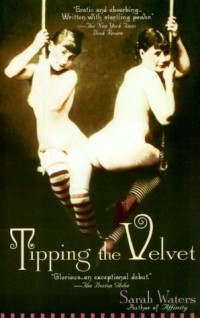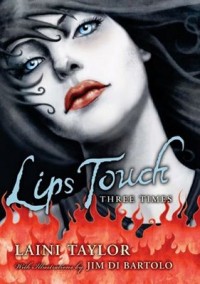What makes a good romance?
I've never considered myself a romance reader, but lately I've been thinking a lot about what makes a romance work. This is because there is a romance in Huntress, and initially, it totally did not work. Over the course of several drafts I had to fix it. I started out by reading a some YA romances (they shall remain unnamed). The problem was, they didn't grab me at all. Many of them are about a girl who instantly falls for a sexy/moody/hot boy, and right away that leads to a couple of problems for me.
First, I found that the girl often fell for the boy on first sight — just because he was cute — and his attractiveness was described in quite a lot of detail. A lot of people like to read exactly what a character looks like, but I don't. When a character is supposed to be attractive, I don't want to know too much about how they look, because chances are, that look isn't going to work for me. Everybody has their own personal tastes. But in a lot of these novels, the boy is described so exactly that little room is left for the imagination, and I think that a lot of romance is actually about the imagination: anticipation, hope, longing.
Second, the boy's personality never seemed to live up to their physical attractiveness. I found that the boy was often so in love with the girl that most of his personality seemed to be enmeshed in the girl — in keeping her safe, in making her happy, etc. As a reader, I want the characters to have separate and distinct personalities, and I want them to do things. I also am not a big fan of boys being overprotective of their girlfriends, or of girls yearning to be sheltered by their boyfriends. Frankly, that's a turnoff for me. I feel like romance — real and fictional — should be about thinking bigger, taking risks and doing more.
So. Where did that leave me? I started to think about and read adult novels with romance in them. I thought maybe I was just having an aversion to teenage romance because of its rose-colored glasses, fuzzy focus nature. ((Obviously not all YA romances are like this. Many of them are awesome!))
While I've never read much romance of the bodice-ripper variety, I realized that many of the adult novels I enjoy do have romance in them, but they tend to be more in the romantic suspense category. Mary Stewart, for example, with her fantastic Nine Coaches Waiting, or any of Elizabeth Peters/Barbara Michaels' dozens of gothic romances. Romantic suspense gives the characters something to do while falling in love with each other. This is something I really need, as a reader (I'm just predisposed to enjoy mysteries, I guess).
 I also reread Tipping the Velvet by Sarah Waters, which is not strictly a romance, but it sure is brimming with love (and lustiness). Rereading that novel showed me that a successful romance is all about the build-up — a kiss is meaningless unless the reader is primed to want it. It's all that foreplay, frankly, that drives it home.
I also reread Tipping the Velvet by Sarah Waters, which is not strictly a romance, but it sure is brimming with love (and lustiness). Rereading that novel showed me that a successful romance is all about the build-up — a kiss is meaningless unless the reader is primed to want it. It's all that foreplay, frankly, that drives it home.
This may be why a lot of love-at-first-sight tales don't work for me. I need to have an emotional investment in the characters in order to identify with their desires.
Waters also is relentless in her intense description of the physicality of romance. Her characters always seem to be shaking when they get close enough to touch their love interest; their feelings become manifest in their hands, in their faces, in their voices. This is something that I have had a hard time doing in my own work, because I'm so afraid of being too melodramatic. Reading Waters actually made me feel a lot more free about layering on the emotion, because you know what? First love is totally melodramatic. It's excruciating and overwhelming and amazing, and Waters is brilliant at describing it.
I was eighteen, and knew nothing. I thought, at that moment, that I would die of love for her. — Tipping the Velvet
Reading Persuasion by Jane Austen was also eye-opening. I was surprised by the amount of sexual tension Austen could build with her quite reserved prose. There was one scene in which Anne Elliot is being attacked by her nephews, and Captain Wentworth comes and plucks one of them off her back while not saying a single word to her. This scene followed after chapter upon chapter of build-up in which Anne was constantly thinking about Wentworth and his proximity to her. So when he was so close — and, yes, when he saved her — I actually thought, "Oh my god! He almost touched her!" (swoon)
 One of the YA books I read that really did work for me was Laini Taylor's Lips Touch. I read the first page in a bookstore and practically fell over. Her prose was so precisely designed; so elegantly suffused with emotion.
One of the YA books I read that really did work for me was Laini Taylor's Lips Touch. I read the first page in a bookstore and practically fell over. Her prose was so precisely designed; so elegantly suffused with emotion.
The goblins want girls who dream so hard about being pretty their yearning leaves a palpable trail, a scent goblins can follow like sharks on a soft bloom of blood. The girls with hungry eyes who pray each night to wake up as someone else. Urgent, unkissed, wishful girls. — Lips Touch
It's been so interesting to read these books and think about how to evoke those feelings in my own writing. I think that I was always taught, in English class and in writing workshops, to avoid overwriting. I've always had a kind of paralyzing fear about it — a fear that I would somehow slip over the edge and become a hack. So I tend to be reserved in my fiction, afraid to overstep the bounds of good taste. ((Which, obviously varies for everybody. Nobody has a lock on what "good taste" is; it just seems that way.))
This may be partly because in my personal life, I've always been intensely emotional, and I've had to learn how to deal with those emotions in a healthy way. One of those ways is writing: I have reams of journals, poems, letters, etc., completely covered in purple prose.
So, what makes a good romance? For me, it's the courage to spill all those blood-and-guts moments out onto the page in a way that the reader recognizes as real. It's not about how hot some boy is. It's about taking the yearning and desire bubbling inside, and turning it out, laying it out in the open, so that a reader can drink it all up, and understand with their gut why that character loves another.